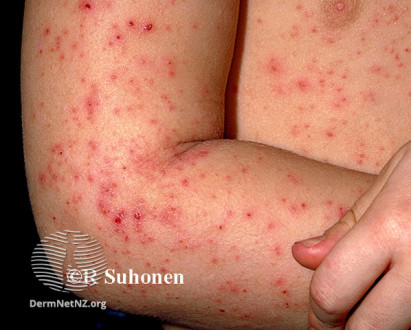Chickenpox is caused by a virus called varicella zoster. Kids who have the highest risk of catching chickenpox are those who:
- haven’t had a chickenpox immunisation
- have never had chickenpox before.
For most children, chickenpox is a mild illness and they'll make a full recovery, but occasionally tamariki will have complications that can range from skin infections to more serious illnesses (pneumonia or brain inflammation).
Symptoms
Chickenpox usually starts with a mild fever and one to two days later red, itchy spots will appear. Before the spots show, your child may have early symptoms including:
- headache
- runny nose
- cough
- loss of appetite
- feeling tired.
Spots typically start on the face and scalp, then spread to the chest, back and tummy and then to the arms and legs. The rash usually becomes very itchy and blisters will appear on each spot filled with liquid. When the blisters burst a couple of days later, a crust will form on each spot which will fall off after one to two weeks.

(DermNet NZ and Creative Commons)
Treatment
If your child has chickenpox:
Stay home
- Keep them from daycare or kindergarten
- Don’t socialise with other families.
Once the scabs have scabbed over and dried, your child is no longer infectious and can return to daycare or school. It can take around five to seven days for scabs to heal.
Hydrate
- Make sure your child drinks plenty of water
- If spots appear in your child’s mouth it will make it hard to eat or drink. Offer clear cool drinks and soft bland foods − avoid acidic drinks such as fruit juices.
Keep them comfortable and minimise itching
- Trim nails short, and use mittens or clean socks to protect your child from scratching
- Dress your child in loose-fitting clothing
- Change bed linens daily
- Give a cool or lukewarm bath to help soothe the itch. You can add oatmeal, baking soda or moisturising bath lotion to the water, but avoid soap since it can dry out the skin. Pat your child’s skin dry, rather than rubbing it, after bathing
- Use calamine lotion to help with the itch, if you find it soothes your child.
Medication
If your child is miserable, you can give them pain relief as needed to make them comfortable. Make sure to follow the dosage instructions, as it's dangerous to give more than the recommended dose.
Don’t give your child aspirin, as this may increase the risk of Reye syndrome (a rare and serious illness) or ibuprofen (also called Nurofen, Brufen, Fenpaed), which may be associated with more severe skin and soft tissue infections after chickenpox.
When to visit a doctor
You should see a doctor if your child has chickenpox and:
- has a high fever
- is very ill
- becomes very drowsy
- is breathing fast or vomiting a lot
- you are worried about them.
Immunisation
The chickenpox vaccine is free for:
- children who are 15 months old
- children who turn 11 years of age after 1 July 2017 who have never had the vaccine or been infected with chickenpox.
Most people who get the vaccine won’t get chickenpox, and if an immunised person does get the disease, it’s usually mild.
Chickenpox